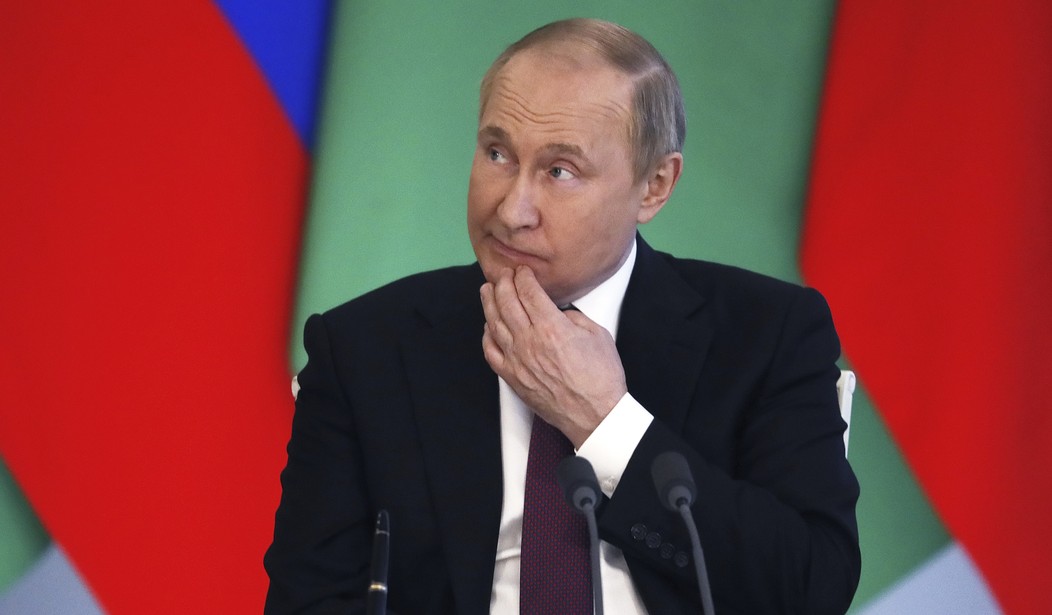In a Kremlin speech last week, President Vladimir Putin identified Russia's real "enemy" in Ukraine as "the ruling circles of the so-called West" whose "hegemony has a pronounced character of totalitarianism, despotism and apartheid."
In the West, Putin declaimed, "The repression of freedom is taking on the outlines of a reverse religion, of real Satanism," which, on issues like gender identity, amounts to a "denial of man."
Putin then formally annexed the occupied Ukrainian regions of Luhansk, Donetsk, Zaporizhzhia and Kherson and pledged to defend these new Russian territories with "all the forces and means at our disposal."
He suggested that those means included nuclear weapons, for which the Americans "created a precedent" at Hiroshima and Nagasaki.
Reading Putin's excoriation, it is hard to recall, in four decades of Cold War, or the three decades since, a speech of such relentless vitriol and hostility toward the West.
Beyond the rhetoric, though, what does this tell us about Putin's policy?
Putin is drawing a red line at Russia's annexation and absorption of the four occupied oblasts in the south and east of Ukraine, roughly 15% of that country, and declaring it to be sacred Russian soil.
He intends to conscript and commit thousands of fresh troops to defend these new Russian territories. He will not rule out the use of nuclear weapons to repel any who attack and attempt to detach these new lands from Mother Russia. While open to negotiations, he will fight it out on this line if it takes all winter.
Recommended
This leaves Ukraine, NATO and the U.S. with some difficult calculations and hard decisions.
Are they willing to engage the Russian army in the four oblasts to drive them out, if the Russians, rather than quit these territories, use a tactical nuclear weapon to repel the attacking Ukrainians?
After Putin's speech, Ukrainian President Volodymyr Zelenskyy asked for the accelerated admission of Ukraine to the NATO alliance.
Were such an accession process to be expedited and Ukraine admitted to NATO, the U.S. would be obligated under Article 5 to go to war against Russia in Ukraine, on Kyiv's side.
This could mean a U.S.-Russia war, which could escalate to World War III and nuclear war, and was something that every U.S. president from Harry Truman to Ronald Reagan saw as his highest priority to avoid.
Fortunately, membership in NATO, and extension of an Article 5 war guarantee for the new member, requires a unanimous vote of all 30 member nations in the alliance.
And the requisite enthusiasm, inside NATO, to fight the world's largest nuclear power over who rules Luhansk is nonexistent.
Which brings us to the sabotage of the Nord Stream I and Nord Stream II pipelines built to carry Russian natural gas across the Baltic Sea to Germany, and from there on to Central and Western Europe.
Late last month, explosions blew holes in both pipelines, preventing any renewal of Russian gas exports to Germany through the pipelines, even if Moscow decided to turn on the taps.
NATO Europe is blaming the Russians for blowing up their own pipelines. But these pipelines are a strategic asset that gives Moscow leverage over the economies of much of NATO Europe.
Putin blames the Americans and Brits for the sabotage and has called for the UN Security Council to investigate the act of "terrorism."
Said Putin, "The sanctions were not enough for the Anglo-Saxons: They moved onto sabotage."
But, again, though Europeans are pointing the finger at Moscow, why would Russia sabotage two pipelines it helped to construct, which give it lasting leverage over the prosperity of NATO Europe?
Why would Putin sabotage his own strategic assets?
What sense would that make?
As of today, the respective goals of the principal participants in the Ukraine war are becoming as clear as they are irreconcilable.
Putin has annexed and seeks to hold Luhansk, Donetsk, Kherson and Zaporizhzhia, attach them to Crimea, declare victory, and end a war he is not winning. This weekend, Russian forces were driven out of the city of Lyman they captured in the early days of this war.
Zelenskyy wants to defeat the Russian invaders, drive them out of his country, humiliate Putin and achieve a victory for Ukraine that would put him in its history books as the Winston Churchill of his nation.
However, it appears today that Ukraine will not be allowed to achieve these goals by Putin's regime, even if preventing it requires the use of tactical nuclear weapons.
And the Americans, what do they want?
Given the Russian losses of troops, tanks, aircraft, armor, artillery, along with the perception that Putin and the Russian army launched a war of aggression against a smaller power and were defeated, America, which provided the weaponry to produce this outcome, is already perceived as a winner.
America should be looking to ending this war before it expands into a nuclear war, which this country has sought to avoid since the atomic age began.

























Join the conversation as a VIP Member